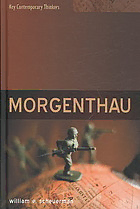
Morgenthau. PDF
Preview Morgenthau.
Morgenthau Hans Morgenthau Realism and Beyond William E. Scheuerman polity Copyright © William E. Scheuerman 2009 The right of William E. Scheuerman to be identifi ed as Author of this Work has been asserted in accordance with the UK Copyright, Designs and Patents Act 1988. First published in 2009 by Polity Press Polity Press 65 Bridge Street Cambridge CB2 1UR, UK Polity Press 350 Main Street Malden, MA 02148, USA All rights reserved. Except for the quotation of short passages for the purpose of criticism and review, no part of this publication may be reproduced, stored in a retrieval system, or transmitted, in any form or by any means, electronic, mechanical, photocopying, recording or otherwise, without the prior permission of the publisher. ISBN-13: 978-0-7456-3635-1 ISBN-13: 978-0-7456-3636-8(paperback) A catalogue record for this book is available from the British Library. Typeset in 10.5 on 12 pt Palatino by SNP Best-set Typesetter Ltd., Hong Kong Printed and bound in Great Britain by MPG Books Ltd, Bodmin, Cornwall The publisher has used its best endeavours to ensure that the URLs for external websites referred to in this book are correct and active at the time of going to press. However, the publisher has no responsibility for the websites and can make no guarantee that a site will remain live or that the content is or will remain appropriate. Every effort has been made to trace all copyright holders, but if any have been inadvertently overlooked the publishers will be pleased to include any necessary credits in any subsequent reprint or edition. For further information on Polity, visit our website: www.polity.co.uk For Lily Contents Acknowledgments viii List of abbreviations x Introduction: Morgenthau’s uneasy Realism 1 1 Radical roots of Realism 11 2 Morality, power, and tragedy 40 3 Defending the national interest 70 4 Politics among nations and beyond 101 5 Utopian Realism and the bomb 135 6 Vietnam and the crisis of American democracy 165 Conclusion: Morgenthau as classical Realist? 196 Notes 199 Bibliography 233 Index 250 Acknowledgments I was inspired to write this book by a wonderful conference that took place in the autumn of 2004 at Gregynog Hall outside Newton in Wales. Organized by Michael C. Williams, Department of Inter- national Politics, Aberystwyth, and devoted to a reconsideration of the intellectual legacy of Hans J. Morgenthau, the meeting brought to my attention the need for an updated survey of Morgenthau’s ideas suffi ciently attuned to contemporary intellectual and political trends. My special thanks to Michael for the invitation to partici- pate, as well to the many speakers for their fascinating insights on Morgenthau and his views. Audiences at Chicago, Cornell, Indiana, McGill, and Vanderbilt Universities have graciously served as guinea pigs as I tried out my sometimes heterodox ideas on Morgenthau. I am also indebted to the journal Review of International Studies for allowing me to inte- grate some sections of an article originally published there into chapter I, and also Constellations for permitting me to reuse (in chapter II) some materials which originally appeared in its pages. Jeffrey Flannery of the Library of Congress provided easy access to the Morgenthau Archives, and Luke Mergner at Indiana University helped dig up copies of Morgenthau’s harder-to-fi nd writings. Emma Hutchinson at Polity has been an exemplary editor in every respect. Finally, I thank the two anonymous referees at Polity for their astute comments, criticisms, and suggestions on an earlier draft. My father was briefl y a student of Morgenthau’s during the early 1970s. In fact, trying to fi gure out how my dad – who, like many in Acknowledgments ix his generation, was radicalized by the events of the 1960s – could think so highly of an erstwhile “classical Realist” like Morgenthau undoubtedly played a role in my decision to write this book. I know that my dad – the fi rst in his family to attend college, hailing from an apolitical and somewhat anti-intellectual working-class family – remains grateful for Morgenthau’s support during a crucial junc- ture in his life. If I have done any justice to Morgenthau’s thinking in these pages, perhaps I can help repay a family debt. This book is dedicated to my daughter Lily, who has accompa- nied and – by capably allying herself with her older sister Zoe – frequently interrupted its composition. Lily’s feisty spirit and contagious smile have provided much-needed respite from working on the volume and thinking about the many frightening historical conjunctures (e.g. Nazism, the cold war, the Vietnam War, and the specter of nuclear war) to which my research necessarily drew me. Lily has also helped remind me of how much remains at stake in a political universe still haunted by many of the same problems – just to mention two: democratic decay and nuclear proliferation – which rightly preoccupied Morgenthau in the fi nal decades of his long career.
